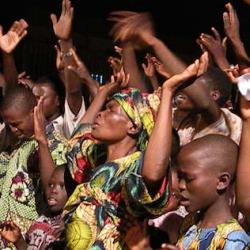Is the autonomous self a European invention? Jean and John Comaroff address this question in their Theory from the South, arguing that certain African tribes have sophisticated conceptions of the self that include an element of autonomy and anticipate “postmodern” conceptions of the subject.
The world of the Tswana peoples in southern Africa “appears to have been highly individualistic in many respects—and palpably competitive. The trope of the self-possessed subject was captured in the concept of itirela, or self-construction, the accumulation of personal ‘name’ (leina) or ‘fame’ (tumo; also ‘noise’) by dint of political acumen, economic patronage, social management, oratorical skill.” The self-construction of the Tswana subject resembles the heroic self-construction of ancient Greece.
Given a “performative conception of personhood,” it follows that “human beings live in a constant state of becoming, a process that ends only at death.” To continue becoming, the Tswana vigorously maintains independence from others: “people retain their autonomy, and protect themselves from being ‘eaten’ by rivals, by taking pains not to open up their bodies, their enterprises, their dependents, or their possessions to undue scrutiny. Or to any intrusion whatsoever.” They might have been reading Goffman’s Presentation of the Self in Everyday Life, as “they perform themselves as fractal subjects, as persons whose very partibility is part of the social fabrication of their selfhood.” The whole conception rests on the possibility of distinguishing a public performative self from the secret inner self—something modern Europeans are sometimes said to have invented.
During the 19th century, European missionaries “sought to replace this species of personhood—which was taken to be a by-product of primitive kinship arrangements—with an inward-turning individualism, one that sought salvation and worldly success strictly as a private pursuit.” Tswana resisted the reduction: They “were quick to draw a sharp contrast between . . . sekgoa, European ways, and setswana, their own cultural practices.”
Despite this resistance, “Setswana was to be transformed by the colonial encounter, by its contradictions and exclusions, by a brutal system of labor migration that ruptured families and domestic lives, by the kinds of double consciousness bred in a world in which Europeans lived with Africans in intimate interdependence while denying those parts of their partible selves that they opened up to others.”
The Comaroffs point is not merely to relativize the Western concept of the self, or to show that “autonomy” of some sort is evident in pre- or non-modern societies. They also aim to show that the African conception anticipates recent developments in Western conceptions of the self: “the Southern Tswana conception of the self that has survived into the postcolonial era seems to have foreshadowed recent shifts in Euro-American ideas of personhood. Not only does their sense of the individual as a constant labor of becoming, of ethical self-construction, call to mind the obsession with ‘personal growth’ in various new wave movements across the north. More seriously, it conjures up the figure of the ‘entrepreneurial self’ that Foucault . . . associates with the rise of neoliberalism; the self who is her or his own capital an und für sich.”
They see that the Western adoption of conceptions of the self that resemble African conceptions has profound political consequences for the West: “because human subjects construct and perform themselves ever more explicitly in terms of those differences, nation-states are having to deal increasingly with the hard facts of heterogeneity. This—in tandem with other historical processes of the medium term—is, we submit, changing the nature of the modernist polity. And changing it in ways, again, in which the global south is running palpably ahead of Euro-America. In ways, too, that raise fundamental questions about the limits of liberalism.”














